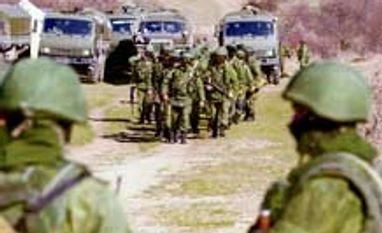Not a bullet has been fired between the Russian and Ukrainian armies, but the financial markets globally have started reacting. As is the case with any such crisis, one of the biggest victim is information flow.
Take the latest one for instance. Russian President Vladimir Putin ordered troops participating in military exercises in western Russia near the Ukraine border to return to their permanent bases. Markets recovered some lost ground on hopes that Putin has softened his stand. On the contrary Putin ended what was a scheduled exercise by being personally present at the Ukraine border and boosting his troops morale. There are no signs of Putin softening his stance.
Ukraine is one of the latest battle ground between Russia and the West led by the US. Russia has openly confronted the US a number of times recently, be it the case of providing asylum to US whistleblower Edward Snowden or its stand on Syria where Russia warned US against interference or the current strong stance taken by Russia against what it calls western interference in its region. In all the earlier instances, it came out a winner leaving President Barack Obama red faced.
More From This Section
This time however, the stakes are higher.
Irrespective of the diplomatic games being played out between the two super powers, markets have started discounting the worst. Equity markets have swiftly shifted from a 'risk-on' to a 'risk-off' mode. Money is moving out of equity markets to safer commodities especially gold and since there is a possibility of a war, speculative positions have built up in oil and gas.
Ukraine, is the epicentre of the crisis. Unfortunately the crisis comes at the worst time in its 22 year old history. Ukraine faces a default on some of its sovereign bonds. S&P has recently cut Ukraine sovereign debt to CCC with a negative outlook. Ukraine has a Euro 60 billion debt and ironically most of it is held by Russian banks. Russia has recently extended a $3 billion loan to the country as part of its promise of pumping in $15 billion for the year. Given the present crises, the status of the remaining loans is unclear.
Ukraine desperately needs money. It's GDP has not been growing for the last two years. Without fresh inflow of funds, a default is inevitable. World Bank report says that if the crises continues the country risks its growth plunging. Ukraine has barely any foreign exchange left with it. Its negotiation with International Monetary Fund (IMF) is ongoing, but analysts are sceptical that the fund will be willing to extend a loan to the country under the present circumstances.
Ukraine along with Russia are one of the largest exporter of wheat in the world. Most of Ukraine's wheat are exported to Russia. Wheat prices have moved higher globally, taking with it other substitutes like corn. However, it is not only the trade and financial dependence of Ukraine on Russia that makes the situation critical.
Russia is Ukraine's primary source of energy. Ukraine imports three-fourth of its oil and natural gas requirement from Russia and 100 per cent of its nuclear fuel. For Russia, Ukraine is strategically important as three of its four gas pipelines which supplies gas to Europe passes through the country.
Russian markets fell by over 11 per cent on news of Russian armies crossing the border. Among the stocks that fell the most were banks. Its currency Rouble fell sharply, falling by nearly 10 per cent in the first two months of the current calendar year. Global markets too have reacted to the development with equity markets falling and prices of gold and oil rising. Markets are pricing in a Russian intervention, much like its intervention in Georgia in mid-2008.
US along with other western countries have threatened an embargo on Russia and Russian companies. Nothing could be worst for the markets. Russia is one of the biggest supplier of oil and gas outside of OPEC. An embargo on Russia would impact the European market, especially the Euro Zone severely. Russia is the main trading partner of finished goods from Euro Zone and provides it with oil and gas in return.
The subsequent rise in oil and gas prices would further slow down world economies, who in the first place are barely growing.
Further imposing an embargo on Russia is a different ball game as compared to North Korea, Iraq, Syria or Iran. Russia is a permanent member of the United Nations and along with China (who have provided tacit support) have veto powers.
As for India, any crisis is bad. An equity meltdown would mean money leaving equity and foreign exchange markets. Further, higher oil and gas prices combine with a weak rupee will complicate the current account deficit problem. India in the global context is a 'risk-on' trade.
German foreign minister Frank-Walter Steinmeier has rightly called Ukraine a “powder keg”. The fuse will be lit not when the guns start firing but when the embargo is imposed. Societe Generale in its global report has said this would have crushing consequences for commodity exporters and advised clients to brace for a slump in emerging market equities of 30 per cent or more this year. Need we say more.
)